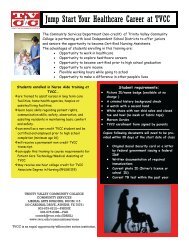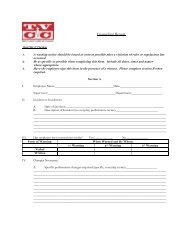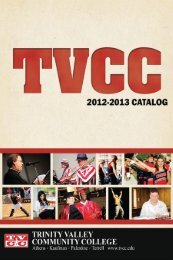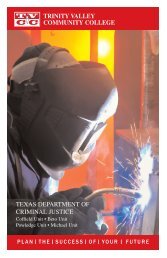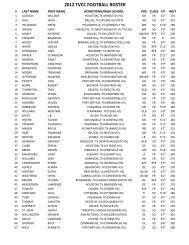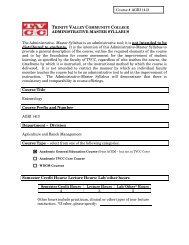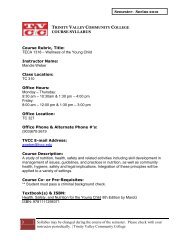Reimbursable Travel Expenses - Trinity Valley Community College
Reimbursable Travel Expenses - Trinity Valley Community College
Reimbursable Travel Expenses - Trinity Valley Community College
You also want an ePaper? Increase the reach of your titles
YUMPU automatically turns print PDFs into web optimized ePapers that Google loves.
<strong>Reimbursable</strong> <strong>Travel</strong> <strong>Expenses</strong><br />
POLICIES AND PROCEDURES<br />
Revised February, 28, 2001<br />
TVCC Graphic & Print Design 903.675.6389<br />
TRINITY VALLEY<br />
COMMUNITY COLLEGE<br />
Office of Dean of Fiscal Services
TABLE OF CONTENTS<br />
Page<br />
SECTION I: Purpose.........................................................................................................1<br />
SECTION II: General Provisions....................................................................................1<br />
SECTION III: Conditions and Procedures ....................................................................1<br />
SECTION IV: <strong>Reimbursable</strong> <strong>Expenses</strong> and Rates<br />
A. Transportation ....................................................................................................2<br />
B. Lodging ..............................................................................................................3<br />
C. Meals ..................................................................................................................3<br />
1. Meals and Incidental <strong>Expenses</strong> (M&IE) Per Diem...................................... 3<br />
2. Actual Meal Cost Reimbursement................................................................4<br />
D. Other <strong>Travel</strong> <strong>Expenses</strong>.......................................................................................4<br />
E. <strong>Travel</strong> Involving One Day or Less.....................................................................5<br />
F. Student travel.....................................................................................................5<br />
G. Reimbursement by Agency Funds .....................................................................5<br />
SECTION V: Taxable <strong>Travel</strong> Reimbursement<br />
SECTION VI: Forms<br />
A. Request For <strong>Travel</strong> Authorization......................................................................6<br />
B. <strong>Travel</strong> Report......................................................................................................6<br />
C. Student Meal Allowance Form ..........................................................................6<br />
D. Hotel Tax Exemption Form ...............................................................................6<br />
EXAMPLES:<br />
A. Trip One ....................................................................................................... 7-13<br />
B. Trip Two..................................................................................................... 14-20
TRINITY VALLEY COMMUNITY COLLEGE<br />
REIMBURSABLE TRAVEL EXPENSES<br />
POLICIES AND PROCEDURES<br />
SECTION 1: PURPOSE<br />
The purpose of this manual is to present, in an organized manner, travel policies and procedures of<br />
<strong>Trinity</strong> <strong>Valley</strong> <strong>Community</strong> <strong>College</strong>. This manual will serve as an orientation vehicle for new<br />
employees as well as a reference manual for current employees.<br />
The Internal Revenue Service periodically makes changes to travel rules and regulations. This<br />
manual will be updated as needed.<br />
SECTION II: GENERAL PROVISIONS<br />
<strong>Travel</strong> is recognized as an essential activity and shall be authorized for these purposes:<br />
• To assess, monitor, evaluate, or implement educational programs and related activities<br />
• To recruit or provide guidance or counseling to students or prospective students<br />
• To provide guidance, consultation, and/or in-service training for employees or prospective<br />
employees<br />
• To direct the acquisition and installation of materials, supplies, and equipment<br />
• To direct and assist in professional development and recruitment of personnel<br />
• To attend relevant conferences with external personnel, organizations, or local, state or<br />
federal agencies<br />
• To conduct authorized marketing activities, contract negotiations, site reviews, and<br />
evaluations<br />
• To conduct audits, budget reviews, fiscal or financial evaluations, or other related activities<br />
• To attend conferences or meetings called by TVCC officers/personnel.<br />
SECTION III: CONDITIONS AND PROCEDURES<br />
<strong>Travel</strong> shall be authorized solely for the purpose of conducting official TVCC business and<br />
reimbursement for travel expenditures to employees is subject to the following conditions:<br />
A. Except in cases of emergency, all travel will be authorized in advance using TVCC’s<br />
Request for <strong>Travel</strong> Authorization form.<br />
B. Out of state travel must be approved by the President of TVCC.<br />
C. <strong>Travel</strong> reimbursements are only available for official TVCC business. Personal business<br />
conducted in conjunction with official travel will not be reimbursed. Also, non-official<br />
travelers’ expenses (spouse, relatives, etc.) will not be reimbursed.<br />
1
D. Reimbursement for travel will be at TVCC stated rates. All rates for reimbursement are<br />
maximum amounts that may be reimbursed. Requests for reimbursements that are less<br />
than the maximum amount are authorized at the traveler’s request. In addition,<br />
departments that have substantial travel costs may elect less than maximum reimbursement<br />
amounts.<br />
E. <strong>Travel</strong> advancements will be requested using TVCC’S Request for <strong>Travel</strong> Authorization<br />
form. This includes all forms of travel advancements such as registration fees, meals,<br />
hotel, airfare, etc., whether or not paid directly to the vendor or employee. Advancements<br />
paid directly to the employee will not be issued more than thirty (30) days in advance.<br />
F. When registration fees are an integral part of travel authorizations, you must include them<br />
on the Request for <strong>Travel</strong> Authorization form and attach a copy of the registration form.<br />
G. A <strong>Travel</strong> Report Form, which reconciles travel advances with actual travel expenses, must<br />
be turned in to the Business Office within fifteen (15) days after travel is completed.<br />
Failure to turn in a <strong>Travel</strong> Report form, along with excess advancements, if any, in a<br />
timely manner could cause your advancements and/or reimbursements to be included<br />
in your taxable income (IRS tax law).<br />
H. Personnel who travel regularly on short trips between campuses and miscellaneous errand<br />
trips and who desire mileage reimbursement should submit a monthly <strong>Travel</strong> Report form<br />
with the proper documentation that substantiates time, place, business purpose, and<br />
mileage for each trip. Although a monthly report is not required for this type travel, it is<br />
preferable to individual travel reports, because it limits the number of checks that need to<br />
be issued. The monthly travel report should be turned in to the Business Office in the<br />
month following the month of travel being reported. Failure to turn in a <strong>Travel</strong> Report<br />
form in a timely manner could cause your reimbursement to be included in your taxable<br />
income.<br />
I. Members of the <strong>College</strong> Board of Trustees may receive reimbursements for travel<br />
expenditures.<br />
SECTION IV: REIMBURSEMENT RATES<br />
<strong>Reimbursable</strong> travel expenses include transportation, lodging, meals, registration fees, and other<br />
similar, ordinary and necessary expenses related to business travel.<br />
A. Transportation<br />
1) <strong>Travel</strong> by airplane, train, bus, or car between home and business destination.<br />
Includes taxi and commuter bus fares, car rental, etc., for travel to/from airport and<br />
business destination, parking fees, and tolls. It is expected that employees will<br />
obtain the most economical airfare available. Reimbursement is actual cost.<br />
Receipts are required for documentary evidence. (Exception is for automobile<br />
mileage allowance reimbursement. See below.)<br />
2
B. Lodging<br />
2) Automobile reimbursement:<br />
a) TVCC vehicle-employee is reimbursed for gasoline purchased; receipts<br />
required<br />
b) Personal vehicle-mileage allowance<br />
i. TVCC vehicle not available – employee is reimbursed at .25/mile<br />
(attach proof of non-availability from office of Dean of Physical<br />
Facilities)<br />
ii. TVCC vehicle available but not used – employee is reimbursed at<br />
.15/mile<br />
3) Due to insurance coverage concerns, only TVCC employees and those individuals<br />
that have prior approval from the Dean of Physical Facilities are allowed to drive<br />
TVCC vehicles.<br />
The cost of the hotel is not limited but is subject to reasonableness. When employees<br />
attend conferences or seminars held at a specific hotel, TVCC will reimburse the actual cost of<br />
lodging at that specific hotel. Note: TVCC is exempt from paying state (Texas) taxes.<br />
Reimbursement for Texas state hotel taxes is not authorized and will not be reimbursed. However,<br />
local hotel tax or occupancy tax is not exempt and will be reimbursed. To avoid charges for state<br />
hotel taxes, a tax exemption form should be presented upon check-in at the hotel. This form may<br />
be obtained in the Business Office. Lodging costs are reimbursed at actual cost; receipts required.<br />
When a non-TVCC employee (spouse, dependent and/or other individual) travels with an<br />
employee, and there is a difference in room rates for single/double, etc., lodging will be<br />
reimbursed at the single rate. The employee is responsible for annotating hotel receipts for such<br />
reimbursement.<br />
C. Meals<br />
The costs of meals may be reimbursed by a “Meals and Incidental Expense” per diem<br />
amount (M&IE) or by actual cost. Employees have the choice of using either the M&IE rate or<br />
keeping records of actual expenses for each business trip. However, the IRS requires the<br />
employee to use the same method for all days within any single business trip. Additionally,<br />
for an employee to be reimbursed for meals and the reimbursements be excluded from taxable<br />
income, the employee must travel longer than an ordinary workday in which the employee cannot<br />
reasonably be expected to complete the trip without rest or sleep. This is the so-called “overnight”<br />
rule (IRS Rev. Rul. 75-170).<br />
1. M&IE per diem reimbursement – Receipts are not required when claiming the M&IE per<br />
diem. Meals and incidental expenses include amounts spent for food, beverages (nonalcoholic),<br />
related tips, laundry, dry cleaning, and tips for services such as baggage<br />
handling. It does not include expenses for telephone, faxes, tolls or taxi fares. In addition,<br />
IRS regulations require that the first and last day of travel must be prorated in accordance<br />
with reasonable business practice. TVCC has elected to prorate based upon time leaving<br />
home on the first day and time returning home on the last day.<br />
3
TVCC Meals and Incidental <strong>Expenses</strong> (M&IE) per diem rate:<br />
Prorated (M&IE) per diem rate:<br />
$26.00/day<br />
$6.00/breakfast<br />
$8.00/lunch<br />
$12.00/dinner<br />
Departure times used to prorate for first business day:<br />
Departure time is on or before 6:00 a.m. = $26.00 allowance (breakfast, lunch, dinner)<br />
Departure time is 6:01 a.m. through 11:30 a.m. = $20.00 allowance (lunch, dinner)<br />
Departure time is 11:31 a.m. through 5:30 p.m. = $12.00 allowance (dinner)<br />
Departure time is after 5:30 p.m. = no allowance<br />
Arrival times used to prorate for last business day:<br />
Arrival time is on or before 1:00 p.m. = $6:00 allowance (breakfast)<br />
Arrival time is 1:01 p.m. through 7:30 p.m.- $14.00 allowance (breakfast, lunch)<br />
Arrival time is after 7:30 p.m. = $26:00 allowance (breakfast, lunch, dinner)<br />
Examples of per diem method:<br />
Example (1): Depart from home on the first day at 6:00 a.m.; 2 nd day is full day, 3 rd day<br />
return home at 8:00 p.m.; per diem amount allowed for trip is $78 ($26 each day).<br />
Example (2): Depart from home at 5:00 p.m., 2 nd day is full day, 3 rd day return home 6:00<br />
p.m.; per diem amount allowed for trip is $52 ($12 for 1 st day, $26 for 2 nd day, $14 on last<br />
day).<br />
Example (3): Depart from home at 6:00 p.m., return home next day at 7:30 p.m.; per diem<br />
amount allowed for trip is $14 ($6 for breakfast and $8 for lunch on day of return).<br />
2. Reimbursement of actual meal costs – Actual costs for meals may be used rather than the<br />
per diem method. Meals include amounts spent for food, beverages with meal (nonalcoholic),<br />
and meal tips. Although there is no limit on actual cost reimbursement,<br />
employees are subject to a "reasonable" cost for meals. Employees must have approval<br />
from the President or Vice-Presidents if actual meal costs exceed the per diem allowance.<br />
Reimbursement using actual meal costs is also subject to the times mentioned above under<br />
the meal per diem method for the first and last day. Receipts required for reimbursement.<br />
D. Other <strong>Expenses</strong><br />
Other expenses include business telephone calls, faxes, copier charges, tips, etc. Note:<br />
Tips are included in the M&IE per diem and cannot be claimed here if using the per diem<br />
method. If using actual costs for meals, then tips for other than meals, i.e., baggage<br />
handling, may be claimed in this category.<br />
4
E. <strong>Travel</strong> consisting of one day or less<br />
The following expenses will be reimbursed when travel involves one day or less:<br />
1. Transportation expenses.<br />
2. Registration fees.<br />
3. Meals – Meals, for travel that involves one day or less, do not qualify for taxfree<br />
reimbursement. (See “Overnight” rule above.) Therefore, TVCC will not<br />
reimburse for meals on one-day travel. Exceptions are “business entertainment<br />
meals”. These are meal costs incurred (a) attending a convention, reception,<br />
banquet, seminar, meeting, civic club, etc., and meal is at such place, or (b)<br />
providing a meal directly before, after or during a substantial business<br />
discussion, i.e., recruiting students and buying the meals. Receipts are required.<br />
4. Other miscellaneous business expenses – telephone, faxes, etc.<br />
F. Student travel reimbursement<br />
Students may be reimbursed for the same travel expenses as employees except the meal per<br />
diem (M&IE) is $6.00 per meal. Actual cost method is also available for students, but is<br />
limited to $6.00 per meal. The President or Vice-Presidents must approve exceptions to<br />
the $6 limitation on actual cost. Faculty responsible for trip may request meals for<br />
students on the Request for <strong>Travel</strong> Authorization form. This may be done on the same<br />
form as the one the faculty turns in for all costs of the trip. After travel is complete, a<br />
<strong>Travel</strong> Report form must be turned in. Attach Student Meal Allowance form showing each<br />
student has signed acknowledging receipt of meal money. If actual cost method is used,<br />
receipts must be attached.<br />
G. Reimbursement by agency funds<br />
Clubs using agency funds for travel should request advancements on the Request for<br />
<strong>Travel</strong> Authorization form. Agencies may use the M&IE per diem or actual cost for meals.<br />
If actual meal costs are used, agencies are subject to “reasonable” cost. Note: You cannot<br />
use the meal per diem using TVCC funds and then request additional meal money<br />
(which would require actual receipts turned in to support reimbursement) using<br />
agency funds or vice versa. This violates the IRS tax regulation requiring the same<br />
method to be used for the entire trip. When trip is completed <strong>Travel</strong> Report forms must<br />
be turned in reconciling TVCC funds and Agency funds travel advancements with actual<br />
expenses. Please contact the Dean of Fiscal Services for further discussion on use of<br />
agency funds for travel expenses.<br />
SECTION V: TAXABLE TRAVEL REIMBURSEMENTS<br />
Per IRS regulations that allow for travel reimbursement to be excluded from taxable income,<br />
failure to comply with the guidelines and procedures as outlined above could result in travel<br />
advancements and/or reimbursements to be included in taxable income.<br />
5
It is the employee’s responsibility to follow TVCC’s travel policies and procedures to avoid<br />
inclusion of travel advancements/reimbursements in taxable income. If such should occur, the<br />
Business Office will notify the employee of travel reimbursements that will be added to taxable<br />
income. Taxable wages will be adjusted accordingly and applicable withholding, social security<br />
and medicare tax will be deducted on the employee’s paycheck.<br />
SECTION VI: FORMS<br />
<strong>Travel</strong> forms may be obtained in the Business Office.<br />
A. Request for <strong>Travel</strong> Authorization<br />
The Request for <strong>Travel</strong> Authorization form is the official document to initiate travel<br />
requirements. This form must be submitted and approved prior to the date travel is to<br />
commence. See examples of completed form.<br />
B. <strong>Travel</strong> Report<br />
The <strong>Travel</strong> Report form is used to reconcile travel advances (even if no advances were<br />
requested, i.e., $0) to actual travel expenses. Original receipts must be submitted with the<br />
<strong>Travel</strong> Report form. Differences in advancements and actual expenses will result in (1)<br />
advances greater than actual expenses and excess returned to TVCC, (2) advances less than<br />
actual expenses and reimbursement due employee, or (3) advances equal actual expenses.<br />
See examples of completed form.<br />
C. Student Meal Allowance Form<br />
The form is used to document student’s receipt of meal money. It must show the date of<br />
travel, destination, student's name, amount of money received, and student's signature.<br />
Example of form attached.<br />
D. Hotel Tax Exemption Form<br />
Employees traveling on business for <strong>Trinity</strong> <strong>Valley</strong> <strong>Community</strong> <strong>College</strong> present this form<br />
upon check-in at hotel to claim exemption of Texas state taxes. Example of form attached.<br />
6
Thursday, May 26, 2005.max
Thursday, May 26, 2005.max
Thursday, May 26, 2005.max
Thursday, May 26, 2005.max
Thursday, May 26, 2005.max
Thursday, May 26, 2005.max
Thursday, May 26, 2005.max
Thursday, May 26, 2005.max
Thursday, May 26, 2005.max
Thursday, May 26, 2005.max
Thursday, May 26, 2005.max
Thursday, May 26, 2005.max
Thursday, May 26, 2005.max
Thursday, May 26, 2005.max
Thursday, May 26, 2005.max



